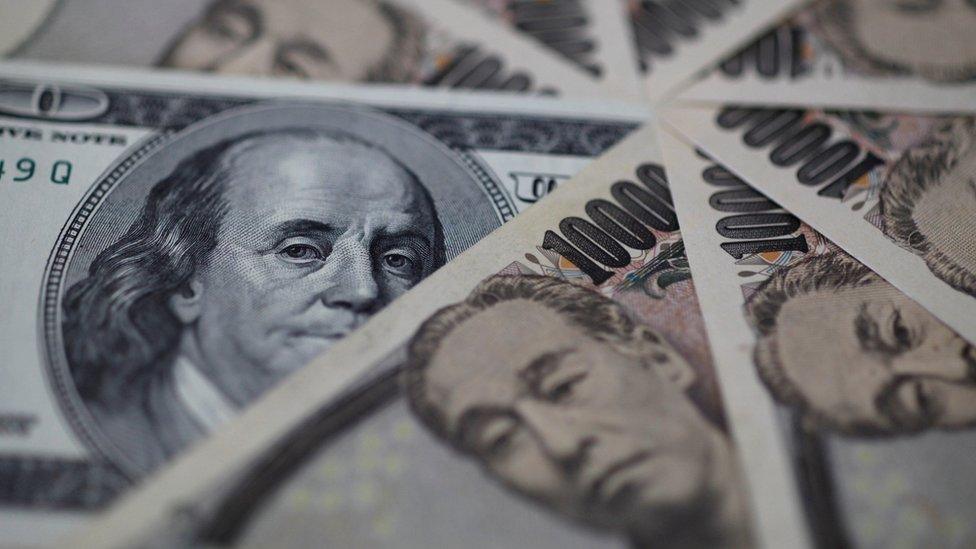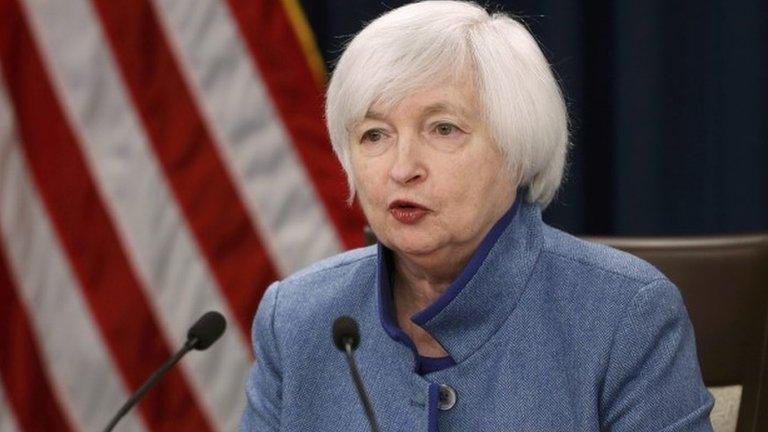US rate rise: Should Asia worry?
- Published

The impact of the Fed rate rise on the US dollar against other currencies is one of the biggest issues for Asia
If you track business news and haven't been hiding under a rock over the last few months, then it shouldn't come as a surprise that the US Federal Reserve raised interest rates overnight.
The Fed has been signalling this for some time, and investors around the world have anticipated the move. The key question is how many more rate hikes are in store?
Here in Asia, currencies have generally been weakening against the US dollar as money has flown out of Asia and into the dollar. That should be good for exports, but bad for consumption as it means holidays, imported goods and even an overseas education are all more expensive for Asian consumers.
But frankly how the US rate rise will affect you in Asia, depends very much on which part of Asia you're in. Here's a quick snapshot:

Many Chinese firms have dollar-denominated debt
China
Beijing's economic policy makers have been watching the US Fed's movements anxiously. Remember, it was China's slowing growth that was often cited by the Fed as a reason to hold off from raising rates in the past.
But as the US economy's prospects have improved, the Fed has forecast more rate rises in the future than initially expected.
That's bad news for China, because funds have been flowing out of the country, looking for better returns elsewhere, and that's been putting pressure on the Chinese currency the yuan.
It's a vicious cycle: the more the yuan weakens, the more investors pull out of it. And that puts Chinese authorities in a tough position. They don't want the yuan to be too weak because that means paying back the debt Chinese firms owe (much of it denominated in US dollars) becomes more expensive. But neither do they want it too strong against the US dollar, because that hurts exports. All of this is coming at a time when China is expected to grow at its weakest pace in more than 25 years. Not a good place to be.

A falling yen helps exporters, but for how long will it benefit the wider economy?
Japan
One man's poison is another man's wine - or in this case, profit. Japanese companies are laughing all the way to the bank as a result of a weaker currency.
Many of Japan's main economic contributors are exporters: think of the likes of Toyota, Honda and Sony.
The yen has fallen by more than 8% since the US election, and tumbled even further against the US dollar today and for the most part Japan is comfortable with a weaker yen. In fact it has taken many steps to weaken its own currency, which have largely failed (think back to negative interest rates at the start of this year).
But the yen can only do so much. And "near-shoring" - the practice of manufacturing goods closer to the markets that you're selling them in - means the weaker yen will only have a temporary positive effect on exporters.
Also if the profits from a weaker yen doesn't pay off in higher wages for Japanese employees, consumption will be affected and that's not good.

Hong Kong's economy could suffer in 2017 from China's slowing growth
Hong Kong
The Hong Kong Monetary Authority has already raised its base rate by 25 basis points to 1% following the US's move. That's because HK tracks the US interest rate moves as its currency the Hong Kong dollar is pegged to the US dollar.
The key issue for Hong Kong is property prices. It's a city with some of the most expensive real estate in the world, and the higher interest rates rise, the more expensive it becomes to own a home - something which is already next to impossible for many young Hong Kongers.
That's fed into a rising sense of frustration and powerlessness that young people have about the political situation there too.
And with Hong Kong's economy so intrinsically linked to China, slowing growth on the mainland will have a knock-on effect so don't be surprised if you see more disenchantment and discontent there.

An outflow of investment from emerging economies means the pace of development is in the balance
Developing markets
Emerging markets are likely to be amongst the worst off from an increase in US interest rates.
As think-tank Capital Economics points out, the Malaysian ringgit has been the worst performing currency in the region over the last month, external, in anticipation of a US rate rise.
Malaysian firms have some of the largest exposure in the region to US dollar debt - and that means paying back those debts just got a whole lot more expensive. Measures to try and limit the currency's fall can only go so far.
Ditto Indonesia and the Philippines. One bright spot though - commodity prices picking up should help resource rich nations like Indonesia and Malaysia.
Meanwhile India's rupee and stocks have also fallen - though some of that is down to domestic issues, not least the sudden scrapping of 500 and 1000 rupee notes which has been widely seen as poorly handled, with citizens struggling to get access to cash. Still, India is expected to grow the fastest of any major economy in 2017.
- Published14 December 2016

- Published14 December 2016
